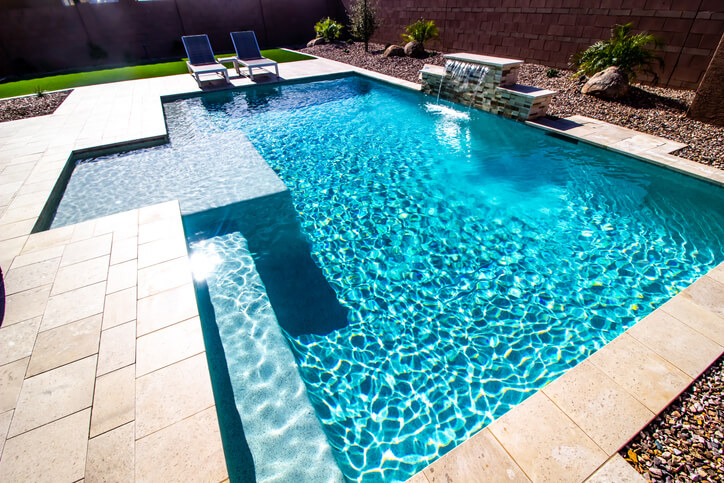With summer going strong and temperatures still climbing, swimming pools across the country are packed with people looking for a relief from the heat. But while the pool can be a relaxing and fun place to spend time, it can also prove dangerous. Drowning accidents in swimming pools are a scary reality for many families and their children, with most occurring at home.
According to the Centers for Disease Control and Prevention (CDC), in the U.S. drowning is the leading cause of death for children. Youngest children (those ages 1-4) are at the highest risk though anyone can drown. In the U.S. there are approximately 4,000 fatal drownings and 8,000 nonfatal drownings per year. Even non-fatal drownings can result in serious long-term health issues, including brain damage. It’s evident that drownings are a serious concern. Luckily though, these drownings are preventable. Here are tips for how to prevent drowning accidents in swimming pools this summer.
In order to know how to prevent drowning accidents in swimming pools, you must first understand the common negligent causes. Such causes include:
- Failing to secure a pool area from small children
- Failing to use a secure pool cover
- Failing to have or maintain safety and life-saving equipment
- Failing to supervise young children or inexperienced swimmers
- Negligent supervision by a lifeguard
- Failing to employ a lifeguard and/or CPR-certified staff
- Negligent maintenance of the pool and/or pool area
- Horseplay in or around the pool
- Broken or defective pool drains, pumps or equipment
- Consumption of drugs or alcohol
You can combat these common negligent causes of swimming pool drowning by protecting against each one.
1. Supervise Children – Always supervise children even if they are around the pool and not in it. It’s imperative that an adult is paying close attention to these children and is not distracted by anything or anyone else.
2. Learn CPR – One of the most important things that you can do is to learn cardiopulmonary resuscitation, also known as CPR. You can find a course near you to ensure you understand the proper techniques. This can be lifesaving in the event of a drowning emergency.
3. Install Pool Fencing – You should have a fence around your pool that is a minimum of four feet in height and doesn’t have any gaps that a child can slip through. It’s also important to find a fence that is self-closing and self-locking.
4. Secure Pool Covers – Many pool covers are not sturdy enough or secured tightly enough. When they are they should be able to support the weight of an adult.
5. Remove Toys When Not in Use – Whenever the pool is not in use be sure to remove any toys, floats, or other enticing items out of the pool and pool area. When children see them, they may try to approach the pool without supervision.
6. Share Water Safety Rules – No only should children learn basic swimming skills, such as floating, but they should also understand water safety rules, such as never running around the pool deck or swimming without adult supervision.
7. Learn Rescue Techniques – When someone in the pool is in distress (especially an adult) it can be dangerous for anyone who tries to rescue them since it’s often instinct for the person struggling to grab onto the rescuer. Because of this, it can be very important to understand basic rescue techniques that can be used without going close to the person in the water. They may include things such as reaching or throwing buoys.
8. Install Pool Alarms – As a parent it can be easy to take your eyes off of your child for a brief moment. Sadly, that’s all it takes for a child to make their way into a pool by themselves. By installing a pool alarm, which sends you an alert when someone goes into the pool area or the water, you can leap into action immediately, preventing a catastrophe.
9. Maintain Proper Safety Equipment – Ensure that proper safety equipment is maintained and kept within reach near the pool area. This may include things such as a first aid kit, life jackets, or a reaching pole. Having a phone nearby can also prove invaluable should you need to call 9-1-1-.
10. Swim Lessons and Water Skills – And finally, one of the most important things that you can do for your children is to enroll them in swim lessons from a young age. Getting them comfortable in the water and teaching them basic water skills can make all the difference.
The Attorneys at Rochelle McCullough Help Those in Dallas Who Have Suffered a Near-drowning or Lost a Loved One Due to Drowning
Drowning accidents are devastating and life-changing. While nothing can allow you to go back in time, those who were negligent in allowing the accident to occur should be held liable. If you have suffered a near-drowning or have lost a loved one due to drowning, you may be entitled to compensation. Be sure to speak with a qualified Texas personal injury attorney who specializes in pool accidents as soon as possible.
The lawyers at Rochelle McCullough will help fight for your rights. To schedule a consultation, contact us today.
